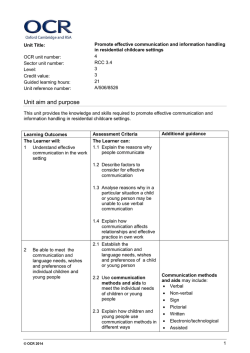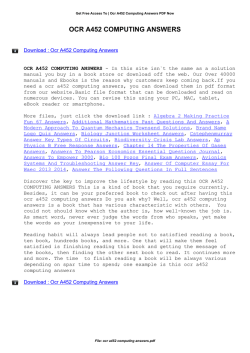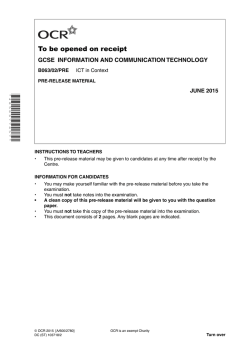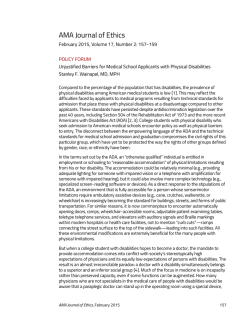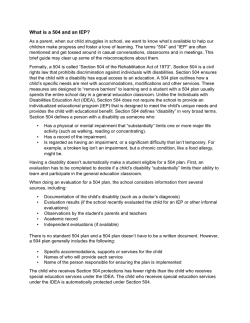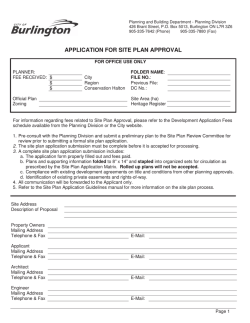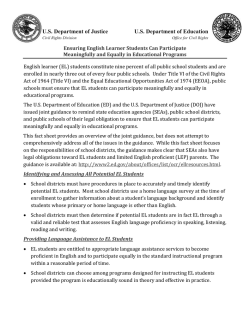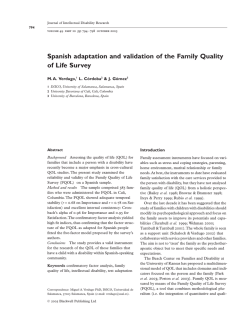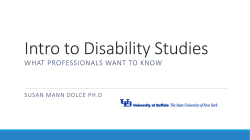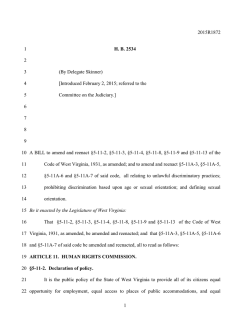
RCC 3.8 Understand how to support positive outcomes for
Unit Title: OCR unit number: Sector unit number: Level: Credit value: Guided learning hours: Unit reference number: Understand how to support positive outcomes for children and young people in residential childcare 8 RCC 3.8 3 2 20 A/506/7618 Unit aim and purpose This unit provides the knowledge and understanding required to support positive outcomes for children and young people in residential childcare. Learning Outcomes The Learner will: 1 Understand how the social, economic and cultural environment can impact on the outcomes and life chances of children and young people Assessment Criteria The Learner can: 1.1 Explain the impact of poverty on outcomes and life chances for children and young people 1.2 Identify the impacts of social and cultural factors on the lives of children and young people 1.3 Explain how the personal choices and experiences available to children and young people can impact on their outcomes and life chances 2 Understand how those working with children and young people can support positive outcomes 2.1 Identify positive outcomes for children and young people that residential childcare services aim to achieve 2.2 Explain the importance of active participation of children and young people in decisions affecting their © OCR 2014 Additional guidance Social and cultural factors e.g. being in the care system housing and community educational environment offending or anti social behaviour health status of self or family member disability health support (GP, health clinic, access to A&E etc) addictions in family or self bereavement and loss family expectations and encouragement religious beliefs and customs ethnic/cultural beliefs and customs marginalisation and exclusion Positive outcomes for children and young people will include those relating to: health education leisure good self esteem positive identity participation in the 1 Learning Outcomes Assessment Criteria lives Additional guidance community 2.3 Explain the importance of designing services around the needs of children and young people 2.4 Explain how to support children and young people to make personal choices according to their needs and abilities 2.5 Explain how social pedagogy aims to support positive outcomes for children and young people 2.6 Explain why it is important for practitioners to have high expectations of and ambitions for all children and young people 3 Understand how disability can impact on positive outcomes and life chances for children and young people 3.1 Explain the impact disability can have on positive outcomes and life chances of children and young people 3.2 Explain the importance of positive attitudes towards disability 3.3 Explain how the social model of disability shapes attitudes and approaches to support positive outcomes 3.4 Describe support available for children and young people with disabilities Disability in this context can include a wide range of conditions, difficulties and impairments eg Learning disabilities Physical disabilities Sensory impairment Long term medical conditions Complex needs Special educational needs Dyslexia Support e.g. speech and language therapy support from health professionals additional learning support assistive technology including electronic and digital systems specialised services Assessment This unit must be assessed in accordance with Skills for Care and Development's QCF Assessment Principles. 2 © OCR 2014 Assessment decisions for competence based learning outcomes (e.g. those beginning with ‘Be able to’) must be made in a real work environment by an occupationally competent assessor. Any knowledge evidence integral to these learning outcomes may be generated outside of the work environment but the final assessment decision must be within the real work environment. This unit is competence based. This means that it is linked to the candidate's ability to competently perform a range of tasks connected with their work. This unit may be assessed using any method, or combination of methods, which clearly demonstrates that the learning outcomes and assessment criteria have been met. This unit requires workplace assessment of occupational competence. Competence based assessment must include direct observation as the main source of evidence. National Occupational Standards (NOS) mapping/signposting This unit has been developed by Skills for Care and Development in Partnership with Awarding Organisations. It is a requirement for new staff working in residential childcare to be working towards these qualifications from 01/01/15. It is directly relevant to the needs of employers and relates to national occupational standards developed by Skills for Care and Development. As such, the unit may provide evidence for SCDHSC0303. Functional skills signposting This section indicates where candidates may have an opportunity to develop their functional skills. Functional Skills Standards English Speaking and Listening Reading Writing X Mathematics Representing X Analysing X Interpreting ICT Use ICT systems Find and select information Develop, present and communicate information Additional information We do not stipulate the mode of delivery for the teaching of the content of this unit. Centres are free to deliver this unit using any mode of delivery that meets the needs of their candidates. Centres should consider the candidates’ complete learning experience when designing learning programmes. The Centre Handbook contains important information for anyone delivering this unit which is part of the residential childcare qualifications. For further information regarding administration for this qualification, please refer to the OCR document ‘Admin Guide: Vocational Qualifications’ on our website www.ocr.org.uk . © OCR 2014 3
© Copyright 2026
